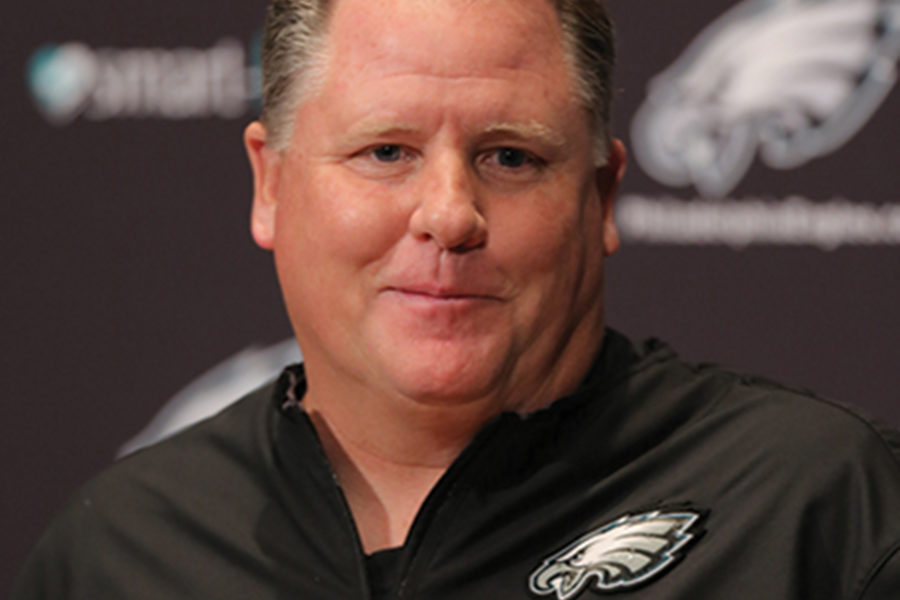
Chip Kelly likes his three-minute eggs ready in two minutes.
Chip Kelly likes the Minute Waltz done in 37 seconds.
Chip Kelly is hailed by some as a genius who is reinventing the game of football, which he says he is not.
Chip Kelly is being derided by some as a medicine man peddling snake oil, which he also says he is not.
What he is doing is fueling a debate about what it is, exactly, that makes for a good coach in that license-to-print-money phenomenon known as the National Football League.
I’ve always thought the most succinct definition was that bit of homespun wisdom offered up by Bum Phillips when he said of Don Shula: “He can take his’n and beat your’n and he can take your’n and beat his’n.”
Hard to argue that.
And then there is Saint Vincent of Lombardi: hard man on a hard team in a hard town. Even now, when the documentarians find a need for portraying those early days, they turn to those iconic sideline shots of Lombardi prowling the frozen tundra, bundled in that great coat, muffler and stocking cap, steam hissing from that gap-toothed grin that wasn’t a grin at all but an ear-to-ear-gash of perpetual vitriol and dissatisfaction, a perfectionist in a sport that forever frustrates the pursuits of perfection, as the microphone reveals when he utters those now-familiar words: “What the hell’s going on out there?”
Lombardi’s Packers shaved the game down to the bone. Their playbook was about a page and a half with but one directive: Run one play and run it ‘til they can stop it. For Lombardi, execution was everything. And at every level, high school to college to the pros, everyone ran the Green Bay Sweep.
Yes, he was a dictator and a tyrant. As Jerry Kramer, the consummate pulling guard, famously said: “He treats us all the same… like dogs.”
That approach in today’s culture would produce an instant mutiny. But at least for the moment the Eagles seem to have bought in on Chip Kelly’s eccentric ways. Of course their allegiance will last for only as long as the winning lasts. Some things never change.
Down through the years the Iggles have run the gamut of coaching ways and philosophies. In case you may have forgotten, and some you should, here’s a those-were-the-days roll-call, the ones I covered, 70s to current:
Dick Vermeil
No one has lasted on billboards as long. To varying degrees, football coaches are slaves to their emotions, but none more so than this man. He was the opposite of Lombardi, given to great gusts of sobbing—he loved his players and cut-down day left him a wreck. They, in turn, would walk through fire in gasoline suits for him.
On the night of July 4th, 1976, with the Eagles encamped at Widener University, there exploded end-of-the-world fireworks, bringing Vermeil, in a snit, to the windows to see what was the commotion.
“Birthday, Coach.”
Vermeil: “Whose birthday?”
“Uh, well, us, Coach. The country.”
Vermeil: “Well hold it down, we’re working on a game plan here.”
Andy Reid
Like Vermeil, Cap’n Andy immersed himself in details, with game plans larger than phone books, every little contingency accounted for, preparation pristine, the script impeccable. His problem came on game day when the script went out the window and it was time to coach-on-the-run, adapt and improvise.
As Mike Tyson has observed: “Everyone has a plan until they get hit in the mouth.”
One word sums up Cap’n Andy: Survivor.
In a town famous for intolerance and impatience and in a profession that eats its own, he lasted at the helm—a remarkable 14 seasons—longer than all of his three predecessors combined (Buddy Ryan, five years; Rich Kotite, four; Ray Rhodes, four).
Buddy Ryan
He rolled in with trumpets blaring and crowing for us to spread the news: “You’ve got a winner in town.” That never did materialize (0-for-3 in the playoffs). He referred to his players not by name but by their number, and when asked to grade them after the initial season—a losing one—he replied: “I give them an F and myself an A-plus.”
He was a one-trick pony, a send ‘em all blitz on every snap, and offense was dismissed cavalierly as “have Randall [Cunningham] make five big plays.”
He found some idolaters in the growing ranks of fans seething over the pinch-penny ways of Norman Braman, the owner, who stripped the team of its best players while Ryan referred to him as “that guy in France.” It was good for snickers, but not wins.
Ray Rhodes
Ray-Bob was a man wrapped tight, so desperate to never let up that he went through life like, he said, there was a loaded and cocked .38 pressed against his temple. He carried ammonia capsules in his pants pockets and asked, “Want a hit?” He gulped antacid pills and blood pressure pills and washed everything down with black coffee.
He fought his way up from Meia, a dusty, hardscrabble Texas town, made a reputation in the NFL as a defensive back who played on the edge of dirty, and gave such impassioned pregame speeches laced with violent images so horrific and graphic that the Eagles did away with his Saturday night pump-them-up oratory because they were already in a foaming frenzy.
In retrospect, it seemed inevitable that a fire lit for so long and so brightly would eventually consume him. And it did. The flameout was spectacular—from coach of the year his rookie season to a 3-13 record his fourth, and final, year.
But there was retribution—it wasn’t all him, Ray-Bob said. After all, as an assistant coach he did go to the Super Bowl.
Five times.
And won them all.
Rich Kotite
He sparred with Muhammad Ali once. Make of that what you will.
He was embarrassingly overmatched as a head coach, regarded by the players as a puppet for the owner. Then again, the owner, Norman (Bottom Line) Braman, purged the payroll and left a shell behind. Then again, when Kotite left the Eagles it was with a winning record. Then again, he coached the Jets and they were 3-13 and 1-15. I always thought he could never get a break. Then again, I’d change my mind.
Marion Campbell
Perfect illustration of how great players don’t necessarily make great coaches. The man called Swamp Fox was a 6’3”, 230-pound All-American at the University of Georgia and an All-Pro defensive end in the NFL. He was country boy strong: “You didn’t mess with Swampy,” said the late Tom Brookshier. “Big guy. Never said a word. His eyes were just slits. Even Chuck Bednarik was careful around him.”
As a player, Swampy helped the Eagles win the championship in 1960, but as the head coach here (1983-85) he had three straight losing seasons (15-29-1). He was head man for all but parts of nine different seasons but never produced a winner. His career mark of 34-80-1 is one of the worst in NFL history, and it is painful to mention that because he was such a nice man, referring to himself in a rich Southern drawl as an ol’ sway back mule. The mystery always was how he was such a bust as a head man, but so successful as defensive coordinator.
Here’s one thought: Too nice.
Mike McCormack
He was an All-Pro as a messenger guard, he is in the Hall of Fame, he coached under Paul Brown, Vince Lombardi and George Allen, and all the way up to 1973 he was around nothing but winners.
And then he came to Philadelphia.
He lasted three seasons, went 16-25-1, and got embroiled in what has always been remembered as the Dog Bone Incident—he was baited into saying his teams had some dogs, and on Monday Night Football fans batted around a giant inflated dog bone while chanting: “Al-Po…Al-Po!”
When McCormack arrived, the Eagles talent cupboard was bare—10 losing seasons out of the previous 11. He brought in veterans, who later admitted they took advantage of the easy-going coach. Too nice, they said.
Sound familiar?
Chip Kelly
In the words of that old song, everything old is new again….
Unless you were in the room with Stagg and Rockne, he is fond of saying, you’re just stealing somebody else’s ideas. Admirable sentiment. Also witheringly accurate.
“We’re not doing anything that hasn’t been done before.”
Just better.
So far.





